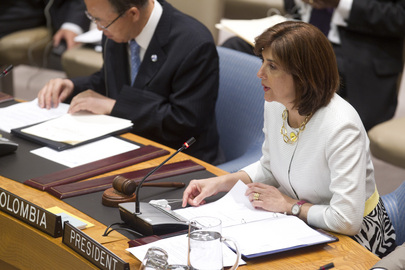Security Council Open Debate on Post-Conflict Peacebuilding, July 2012
On 12 July 2012, the Security Council held an Open Debate on Post-Conflict Peacebuilding. The discussion, grounded in a recent concept paper entitled, “Post-conflict peacebuilding: report of the Peacebuilding Commission,” focused upon the role of the Peacebuilding Commission (PBC) in facilitating states' transitions from conflict to sustainable peace. The debate did not result in the adoption of an outcome document.
The debate featured 48 statements, including those from the Secretary-General, the former Chairperson of the PBC, the current Chair of the PBC, the Vice-President and Head of Network Operations, Policy, and Country Service of the World Bank, the permanent and non-permanent members of the Security Council, and 29 other member states. The discussion was less attentive to gender than the previous Council debate on this issue: only 8 out of the 48 statements—approximately 17%—addressed the gendered dimension of post-conflict peacebuilding.
Gender Analysis
Overall, the debate failed to adequately address the gendered aspects of post-conflict peacebuilding. Speakers were primarily concerned with discussing cooperation among international institutions, often focusing on the relationship between the Security Council and the PBC; this had the effect of diverting attention away from gender issues. However, 8 speakers—Burundi, Chile, Mexico, Norway, Portugal, Sweden, Togo, and the United States—addressed the gender implications of the topic.
Several of these speakers stressed the importance of incorporating women's perspectives into post-conflict recovery efforts. Togo noted that such inclusion is critical to the long-term success of any attempt to promote good governance. Sweden reiterated this notion, arguing that commitment to inclusive governance and political reform must involve women as agents of change. Chile emphasized that efforts to support women's participation must start at the beginning of any post-conflict initiative.
As a state that has experienced the effects of the Commission's work, Burundi offered unique insights on the PBC's post-conflict work and gender. Attesting to the fact that the Commission's efforts to establish justice and good governance were fulfilled with consideration of the gendered impact, Burundi argued that the PBC is largely responsible for its post-conflict gains in women's political representation: nearly half of Burundi's Parliament members are now women.
Norway was one of many speakers to stress the financial needs of the Commission, calling for emerging powers to increase their support to the Peacebuilding Fund. Yet, Norway differentiated itself by highlighting the importance of one unrealized PBC financial goal: that 15 percent of the Commission's funds be allocated to focus on women's specific needs. Norway urged member states to renew their commitment to this aspiration.
General Analysis
 María Ángela Holguín Cuéllar (right), Minister for Foreign Affairs of Colombia, chairs the Security Council’s debate on peacebuilding in post-conflict situations. Colombia holds the Council’s rotating presidency for the month of July. At left is Secretary-General Ban Ki-moon. (UN Photo/Mark Garten)
María Ángela Holguín Cuéllar (right), Minister for Foreign Affairs of Colombia, chairs the Security Council’s debate on peacebuilding in post-conflict situations. Colombia holds the Council’s rotating presidency for the month of July. At left is Secretary-General Ban Ki-moon. (UN Photo/Mark Garten)
Beginning the debate, Secretary-General Ban Ki-moon underscored the challenging nature of post-conflict transitions to peace and the important role filled by the PBC, noting, “We had come to understand that we can succeed only if we work in close partnership with other key international actors, in support of nationally owned priorities.” Following the Secretary-General's lead, speakers throughout the debate consistently highlighted the worth of the PBC.
During the discussion, the representatives of Burundi, Liberia, and Sierra Leone described how the PBC's work has affected their countries. These states, which constitute three of the six countries currently on the Commission's agenda, offered suggestions to improve the work of the PBC. All highlighted the value of increased interaction between the Security Council and the Commission.
Other speakers also put forth ideas for strengthening the PBC's capacity. Many stressed the need for national ownership, increased consultation of local civil society actors, and enhanced coordination among Member States, the UN, and financial institutions. Their statements were framed by the concept paper, “Post-conflict peacebuilding: report of the Peacebuilding Commission,” which traces both the gains made by the Commission since its inception and its current limitations. The debate suggested that the Peacebuilding Commission is an institution of promising—yet not fully realized—potential.
Statements
States represented at the debate included: Argentina, Armenia, Australia, Azerbaijan, Belgium, Brazil, Burundi, Canada, Chile, China, Colombia, Croatia, Egypt, France, Germany, Guatemala, India, Indonesia, Ireland, Japan, Liberia, Luxembourg, Malaysia, Mexico, Morocco, Nepal, New Zealand, Nigeria, Norway, Pakistan, Portugal, Republic of Korea, Russian Federation, Sierra Leone, South Africa, South Sudan, Sudan, Sweden, Switzerland, Togo, Tunisia, United Kingdom, United States.
UN and civil society representatives speaking at the debate included: Secretary-General Ban Ki-moon, Former Chairperson of the Peacebuilding Commission Eugene-Richard Gasana, Chair of the Peacebuilding Commission Abdulkalam Abdulmomen, Vice-President and Head of Network Operations Policy and Country Service of the World Bank Joachim Von Amsberg, the European Union.
*Bolded speakers referred to gender.
